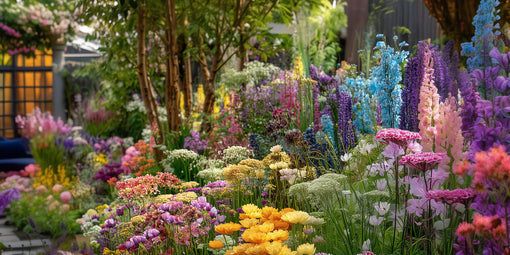
- Article published at:
Drawer menu

Does it also frustrate you when you get a new bunch of flowers delivered to your home, you place them in a vase and you get gaps in your bouquet?
Luckily, we at LOV Flowers, got some tricks on how to prevent these open spaces. Tricks that will give your bouquet lots of volume and look like a florist personally have arranged your vase for you!

Take the time to arrange your stems in categories, so you are properly prepared. Place the stems in categories of soft, strong & mid-length or strong & long.

Create the base of your bouquet with the mid-length stems. Often these are foliage or bushier flowers. Remove any excess leaves of the stems before placing them in the water.
Don’t leave any leaves that will be under the waterline, those will only dirty the water and create bacteria. Trim the stems diagonally at a 45-degree angle. That way the flowers can drink more effectively.

Place a mid-length stem all the way down, so that it’s touching the bottom of the vase and have the upper half rest against the upper rim of the vase. Mirror this with another same length stem, creating a cross.

Next step is to turn your vase 180 degrees and place the next mid-length stem over the ones you’ve already places. By doing this you are creating a frame for your bouquet.
Keep turning the vase 180 degrees and add your same length stems in a cross over the previous stem.
A tip here is to alternate colours so you get a colourful effect. Don’t worry about doing it perfectly, a looser messier bouquet is usually prettier. And if you wish you can always adjust the stems at the end.

Place the soft stems between the branches. You can have them resting against the other stronger stems so that they’ll stand up straight. Repeat step 4 with your softer stems and keep alternating the colours.

Lastly add the longest stems, which is usually the statement flowers such as roses, peonies or snapdragons of your bouquet!
Once the vase is arranged wait a day or two before you take any pictures of it. Until the flowers are in bloom so you get the best effect.
For a picture-perfect arrangement place the flowers in a spot with plenty of natural sunlight and preferably against a neutral background. That way the flowers are in focus!
This guide is specifically for a round-facing display that looks best placed in the middle of a dining table or a kitchen island, and is best suitable for when you have lots of stems to work with.
If you have fewer stems or if you are planning on placing your vase on a side table in the hallway or up against any wall, then better go for a front-facing display where all the flowers are facing forward.
View this video below to see how to make a bouquet using the spiral technique!